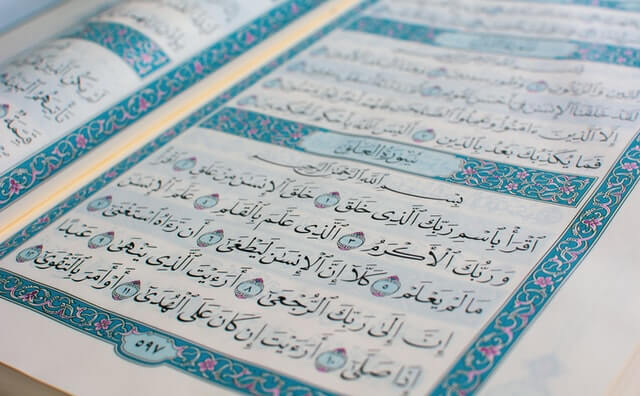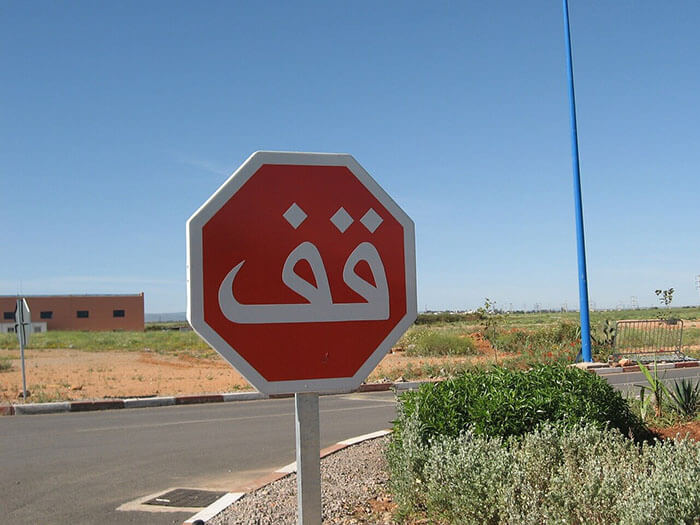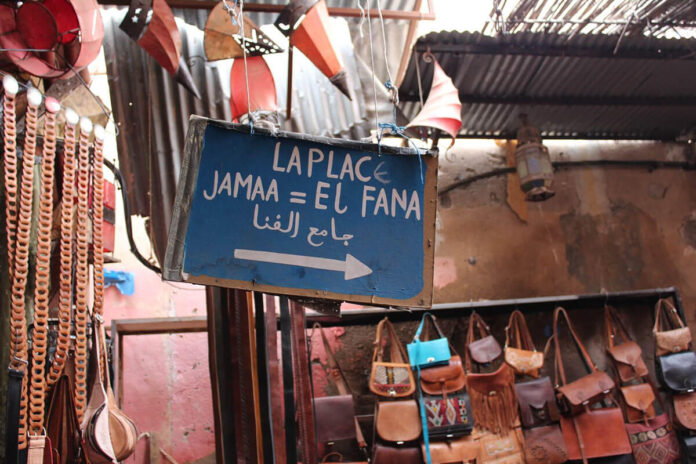The official language in Morocco is Arabic, although French, the legacy of the protectorate, is still widely used in the cities (much less so among rural Berbers). Morocco’s close ties to France help to explain its continued importance in education, business, and the press.
What language is spoken in Morocco?
The official language of Morocco is Arabic, but a large proportion of the population, especially in the cities, is bilingual in Arabic and French; most signs and street names are bilingual, too. If you can get by in French you should have no communication problems anywhere except in remote Berber villages, where the original Berber language is still spoken. Although written Arabic is the same throughout the Arab world, the spoken dialect of Moroccan Arabic is quite distinctive, and travelers who have learned the Arabic of the Middle East will struggle to get by.
Moroccan Arabic language

Moroccan Arabic (Darija) is a dialect of the standard language, but is so different in many respects as to be virtually like another tongue. It’s the everyday language that differs most from that of other Arabic-speaking peoples. More specialized or educated language tends to be much the same across the Arab world, although pronunciation varies considerably. An Arab from Jordan or Iraq will have little trouble discussing politics or literature with an educated Moroccan, but might have difficulty ordering lunch.
The influence of French in Morocco is seen in some of the words that Moroccan Arabic has adopted. An example is the use of the French word for ‘coach'(intercity bus), car.
The spread of radio and TV has increased Moroccans’ exposure to and understanding of what is commonly known as the Modern Standard Arabic language (MSA). MSA, which has grown from the classical language of the Quran and poetry, is the written and spoken lingua franca (common language) of the Arab world, and in fact not so far removed from the daily language of the Arab countries of the Levant. It’s the language of all media and the great majority of modern Arabic literature.
Berber language of Morocco « Tamazight »
There are three main Berber language “dialects” in use, mainly in the Rif and Atlas Mountains. Modern means of communication have left only a minority of Berbers monolingual, most speak at least some Arabic. Which is in a certain sense also serve as loose lines of ethnic demarcation.
In the north, in the area centered on the Rif, the locals speak a dialect that has been called Riffian and is spoken as far south as Figuig on the Algerian frontier. The dialect that predominates in the Middle and High Atlas Mountain and the valleys leading into the Sahara goes by various names, including Braber or Amazigh.
More settled tribes of the High Atlas, Anti-Atlas Mountain, Souss Valley and south-western oases generally speak Tachelhit or Chleuh.
And of course, it never harms to try a couple of words of the Berber language when you’re in those areas! Even if simply “please, Hello and thank you”. After all, almost every Moroccan Berber appreciates a visitor’s effort at the regional language. An easy initiative often results in a warm reception and also a little bit of friendly discussion.
Just recently, the language of the Amazigh was formalized as well as is currently a couple of official languages of Morocco.
Must Read: Berbers of Morocco | Origin, history, culture, lifestyle …
Spanish, English, and French in Morocco

The most commonly spoken European language in Morocco is French, so if the thought of getting your tongue around Arabic is too much. It would be a worthwhile investment to learn some French
An inability on the part of westerners to speak French is seen by some French-speaking (and therefore at least bilingual) Moroccans as the height of ignorance.
To a lesser extent than the French, the Spanish have maintained some hold in northern parts of the country, where Spain exercised administrative control until 1956. You may also come across it in the territory of the former Spanish Sahara, over which Madrid relinquished control in 1975, and the former enclave of Sidi Ifni. In towns like Tetouan, for instance, Spanish is more likely to be understood than French.
Reforms to the education system include the introduction of English into the curriculum for younger students, so it may become more widely spoken. However, English speakers will find that a smattering of basic French (and a little Spanish) can be a great asset. In the main cities and towns, you will find plenty of people, many of them touts that you may not necessarily want to hang around with, who speak a variety of languages, including English, German and Italian.
Learn Moroccan dialect
Foreign students of the language constantly face the dilemma of whether first to learn MSA (which could mean waiting some time before being able to talk with shopkeepers) and then a chosen Moroccan dialect, or simply to acquire spoken competence in the latter.
If you do take the time to learn even a few words and phrases, you’ll discover and experience much more while traveling through the country. Just making the attempt implies respect for the local culture that Moroccans all too infrequently sense in visitors to their country.
Greetings & Civilities language in Morocco
When Arabic speakers meet, they often exchange more extensive and formalized greetings than westerners are used to. Any attempt to use a couple (whether correctly or not) won’t go astray.
When addressing a man the polite term more or less equivalent to Mr is “asīdī” (shortened to “sī” before a name); for women, the polite form of address is “Lalla”, followed by the first name. You may be addressed as ‘Mr. John’ or “Mrs. Anne’. To attract the attention of someone on the street or a waiter in a cafe, the expression “shrīf” is commonly used.
Moroccans greet each other with a flood of formalized greetings and nothing will give you or them greater pleasure than to partake in this formulaic but deeply gracious system of starting a conversation. A standard greeting will go something like this:
Ssalamu ‘lekum (Peace be upon you.)
-wa ‘lekum as-salam (And upon you.)
Labas? (How are you? – literally ‘no harm?’ – in both Arabic and Berben.
-Labas, barak llāhū fik (Fine, thank you.)
Kulshi bekhīr? (Is everything OK?)
-Bekhir, Ilhamdū llāh (Fine, praise God.)
This can then continue for as long as is desired:
Ssehha labas? (Is your health OK?)
La ila labas? (Is your family OK?)
Ddrari labas? (Are your children OK?)
And so on…
Other essential phrases include the ubiquitous ensha’llāh (God willing) and the less frequent besmellāh (in the name of God), proclaimed before eating, traveling, or anything you wish to commend to or do in God’s name.
‘Thank you’ is the standard shukran but you’ll get extra points for shukran bezzef (thank you very much) or the Berber equivalent barak llāhū fik. Goodbye is either bessalama, m’a ssalama (literally ‘with peace’) or lla yhennik (May God give you tranquillity).
Pronunciation of Moroccan Arabic

Pronunciation of Moroccan Arabic can be tongue-tying for someone unfamiliar with the intonation and combination of sounds. Pronounce the transliterated words slowly and clearly.
The Arabic or Moroccan Darija “dialect” language guide should help. But bear in mind, the myriad rules governing pronunciation and vowel use are too extensive to be covered. You must try Google voice or other apps on your phone to pronunciation some Arabic words.
Study Arabic language in morocco
The business of learning the Arabic language is fairly undeveloped in Morocco and the possibilities for doing so are strictly limited.
Apart from possible summer courses at the university in Rabat and Fez, your best bet would be to head for the Arabic Language Institute, and language centers.
The institute has been going since 1983 and is affiliated with the American Language Center. Classes are generally quite small, so each student can expect a reasonable amount of individual attention. The institute offers courses for three/six weeks. The institute can also help with accommodation, either in hotels or on a homestay basis with Moroccan families.
Another option in Fez and Casablanca, there are many private schools that offer Arabic and other language courses. A three-/nine-hour introductory session (with meal) and deals with conversational Arabic and an introduction to the alphabet. A 60-hour course spread over four weeks.
Some branches of the Institut Français run Arabic courses, notably in Tangier, Fez, and Marrakesh.
Small Talk
What’s your name? ………… asmītek?
My name is … smītī …
How old are you? …………… shhal f’merek?
I’m (25)………………………….’āndi (khamsaū’ashrīn) ’am
Where are you from? ……… mnīn nta/nti/ntūma?(m/f/pl)
I’m/We’re from …………….. ana/hna men … :
Germany………… almānya
America ………… ’amrīka
Australia ……….. ustralya
Canada ………… kanada
England ………… anglatira
France …………. fransa
Italy ………………’ițālīya
Japan …………… el-zhaban
The Netherlands .. hulanda
Spain ……………. isbanya
Sweden ………… sswīd
Switzerland …….. swīsra
Although Moroccans will not expect you to know any Arabic, and will always greet you in French or English, it is polite to learn at least a few basic phrases. The Berlitz FRENCH PHRASEBOOK AND DICTIONARY and ARABIC PHRASEBOOK AND DICTIONARY will cover most situations you are likely to encounter in Morocco.










